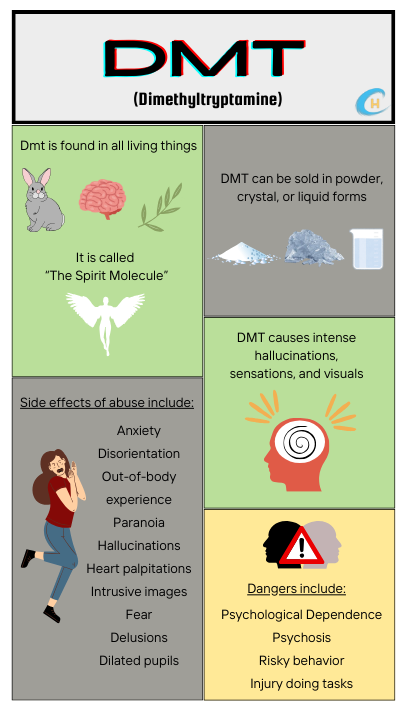How long does DMT last?
Psychedelic and hallucinogenic drugs are increasingly popular for recreational use. Some popular ones include magic mushrooms and DMT. N, N-Dimethyltryptamine (DMT) is a strong psychedelic chemical compound naturally occurring in some animals and plants. It has a similar chemical structure to magic mushrooms and is known to produce intense short-term visual hallucinations. DMT is also the main psychoactive ingredient in the controversial practice of ingesting Ayahuasca.

For centuries, DMT and Ayahuasca have been a part of many South American cultures and used in religious and spiritual ceremonies. Ayahuasca is brewed into a tea made from DMT and a wide range of other herbs, plants and compounds. Indigenous populations in countries such as Ecuador, Brazil, Peru and Colombia have embraced Ayahuasca as part of their history and culture.
The psychoactive drug has been subject to both recreational and scientific research. It is mainly used recreationally for its hallucinogenic effects. In a 2021, Global Drug Survey, research found that about 7.4% of participants from the study reported micro dosing on DMT. Micro dosing is a form of drug taking in which a user takes small amounts of the substance to induce the slightest effects and to produce insight and creative thinking. Some data suggests the effects of DMT on the brain may be able to mimic a near-death experience.
What is DMT?
DMT is a Schedule I controlled substance making it illegal to produce, possess, purchase or distribute. It is in the class of chemical compounds known as tryptamines. These types of chemicals alter the serotonin levels in the central nervous system. It causes the brain to release serotonin. Serotonin affects a person’s mood, thoughts and emotions. Serotonin is also involved in other aspects of mind and body functions including sleep, memory and appetite. However because it releases high amounts of serotonin, the user is also at risk for developing serotonin syndrome. Serotonin syndrome is a condition in which the body is flooded with too much serotonin and can cause seizures, obstructed breathing and induce coma.
When synthetically produced, DMT comes in a solid crystal form or crystalline white powder form. It is most commonly consumed through an Ayahuasca brew, but can also be smoked, snorted, or injected. Popular street names for DMT include Spice, Businessman’s Trip, Dimitri, The Spirit Molecule, Changa and Fantasia.

Side effects of DMT
- Intense rush
- Altered sense of time
- Sense of floating and varied perception of reality
- Euphoria
- Changes in mood and emotions
- Sensitivity to bodily sensations
- High blood pressure and chest pain or tightness
- Dilated pupils and rapid eye movements
- Intense visual hallucinations where you hear and see things that do not exist
- Disassociation and depersonalization
- Distorted sense of time
- Agitation and paranoia
- Uncontrollable anxiety, delusions and psychosis
- Seizures and spasms
- Flashbacks – flashbacks are triggered by stress and fatigue and can occur within a few days, weeks and months after the drug was initially taken. More intense flashbacks, also known as hallucinogen-persisting perception disorder (HPPD), are a rare occurrence. These flashbacks are more likely to occur in users with existing mental health conditions such as anxiety and depression.
Check Your Insurance Coverage for FREE
Find out if your insurance covers addiction treatment in minutes. We accept most insurance!
The effects of psychedelics can affect everyone differently. It can cause both positive and negative “trips” depending on a few factors. A user’s state of mind can impact how they react to the drug. If they have had previous experience with psychedelics can also affect the user’s reaction. The environment in which the user is participating in drug use impacts how the drug feels. A loud and chaotic setting might produce a negative trip, while a calm and quiet setting might produce a positive and euphoric trip. Being around trusted people while on DMT can also reduce the risk of experiencing bad hallucinogenic effects.
How long does DMT last?
How long the effects of DMT last can depend on many factors including method of ingestion, potency of the drug and if there is any other substance within your system. In general, the effects of DMT last between 30-60 minutes. This is considered a short amount of time compared to other psychedelic drugs.
When inhaling, snorting or injecting DMT, the effects can last between 15-60 minutes. A typical amount of DMT that is smoked is about 40-50mg. However, some people can use as much as 100mg. When smoked, the effects of the drug reach its peak at about 2-5 minutes and can last for about 30 minutes as the drug effects slowly taper off. When DMT is intravenously injected, it instantly reaches the bloodstream causing a rapid onset of effects that peak around five minutes and last for a duration of about 30 minutes. When injected intramuscularly, DMT has a 2-3 minute onset time and can last between 30 minutes to an hour.
When taking DMT through an Ayahuasca brew, onset of effects could take up to 30-45 minutes with the effects lasting for up to four hours. When DMT is ingested in a brew, the average amount is about 0.6-0.85mg for every kilogram of liquid. The onset of effects begins around 60 minutes, peaking at around 90 minutes and can last for several hours.
Reach out to Hotel California by the Sea
We specialize in treating addiction and other co-occurring disorders, such as PTSD. Our Admissions specialists are available to walk you through the best options for treating your addiction.
Treatment for Substance Use Disorder
According to the National Institute on Drug Abuse, it is still very unclear whether or not DMT can be considered an addictive substance. From scientific studies, there is little evidence showing that the drug can lead to tolerance or physical withdrawal. There is also very little research showing any of the long-term side effects or damages caused by using DMT. DMT is not a well-researched substance. Despite producing strong and intense effects, DMT is not known to cause an addiction unless it has been used with other mind-altering substances. Using drugs such as alcohol or opioids can increase the risks of becoming addicted to the psychoactive drug. Behavioral treatment programs such as Hotel California by the Sea provide the most up-to-date evidence-based treatments as well as a supportive environment in which people can overcome their addiction.
Our treatment program provides services at all levels of care including detox, residential, PHP and IOP. Evidence-based treatments such as CBT, DBT and group therapy help clients get to the root causes of their addiction. These treatments also help treat any co-occurring mental health conditions that occur alongside a substance addiction. Though, DMT alone does not usually cause drug misuse or abuse, when combined with other substances the drug can become addictive and lead to both physical and psychological damage.
References:
https://adf.org.au/drug-facts/dmt/
https://drugfree.org/drugs/what-is-dmt/
https://www.healthline.com/health/what-is-dmt
https://www.medicalnewstoday.com/articles/306889
https://www.addictioncenter.com/drugs/hallucinogens/dmt/
https://psychcentral.com/drugs/what-is-dmt
https://www.medicalnewstoday.com/articles/how-long-does-dmt-last
